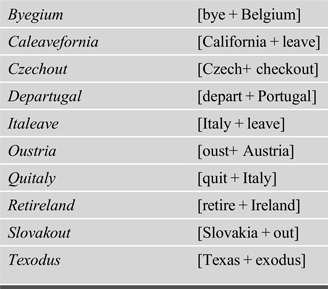Introduction
The UK's June 2016 decision to withdraw from the European Union, popularly referred to as Brexit, has had a major political, financial and economic impact worldwide. However, the impact was also linguistic as this event has generated a myriad of neologisms in English, such as breferendum, brexiteer, Brexitsphere, regrexit or Brexitology. The aim of the present study is to give a general overview of these new words, to establish the predominant word-formational patterns as well as to point out the creativity and speed with which speakers of English have reacted linguistically to this change in the socio-political context.
Linguistically speaking, the word Brexit, documented as early as 2012, is thought to be modelled after Grexit (Greece/Greek + exit), ‘a term which had appeared earlier in the year in reference to the possibility of Greece leaving the Eurozone’ (Maxwell, Reference Maxwell2016). After its relatively short co-existence with Brixit, another novel blend coined to refer to the same event, Brexit has now established itself as a household word in the English lexicon. It was shortlisted by Oxford Dictionaries as The Word of the Year in both 2014 and 2015 and was later entered into their online dictionary and defined there, prior to the actual referendum, as ‘a term for the potential or hypothetical departure of the United Kingdom from the European Union’,Footnote 1 which may indicate its relatively quick conventionalization, lexicalization and institutionalization in the English language. As Leyland (Reference Leyland2016) points out, ‘[t]he speed with which it became widely used and recognized was impressive, fuelled by the fact it filled an empty space in our language, and the growing importance of the phenomenon it described’. Following the appearance of Brexit, and induced by the events closely preceding and following the British referendum, held on June 23, 2016, as well as the public perception of the impact of the UK's subsequent decision to leave the EU, a multitude of other creative coinages appeared as a result, many of them using Brexit either as a model, a source word, or merely as an inspiration for other creative coinages.
After this brief introduction, in the next section we deal with the material used for the analysis and its compilation, after which we respectively look at and discuss the neologisms which have been created using (1) Brexit as a model, (2) Brexit as a source word, and (3) Brexit as an inspiration. In the penultimate section of the paper we discuss some of the main reasons for linguistic creativity, especially those which can account for linguistic creativity triggered by Brexit. Finally, we offer some concluding remarks.
Material
The material for our analysis was compiled in the period from June to November 2016 (closely preceding and following the June 23 referendum) from various sources: news media (broadcast and online), social media such as Facebook and Twitter, blogs and internet forums. We also examined available photographs and videos taken during some of the pro-Brexit and pro-EU protests held in the UK around the time of the referendum in search of any new Brexit-related words. From the diverse data we collected, we were able to isolate exit, leave, remain, Britain and EU as the most frequent source words in the formation of Brexit-induced neologisms. This, of course, does not come as a surprise as the semantic opposition of exit/leave vs. remain and the perceived socio-political opposition of Britain vs. EU constitute key elements in the conceptualization of Brexit. Therefore, the focus of this paper will be on those Brexit-induced neologisms, 71 in total, whose source words are exit, leave, remain, Britain and EU, but also on neologisms formed according to analogy with Brexit (e.g. Germexit, Portugexit) or inspired by it (Departugal, Italeave). Needless to say, this list is not exhaustive as surely there are words that have escaped us. However, we believe it represents an illustrative sample of linguistic tendencies in the formation of neologisms related to this sensitive period of British history.
Some of the words are clearly here to stay whereas others will surely be soon forgotten, failing to make a lasting contribution to the English word stock. And while predicting their failure or success can be a challenging and insightful linguistic endeavour (see, for example, Metcalf, Reference Metcalf2002), no such attempts will be made in this paper. Our aim is merely to record those neologisms, believing, as Štekauer (Reference Štekauer2002) does, that whether a word
will be spread over the whole speech community [ . . . ] or whether it will be confined to a single use on the part of a single speaker is insignificant. What is important is that language has demonstrated its productive capacity to generate a new, well-formed linguistic sign by means of its productive Word-Formation Rules whenever the need arises (Štekauer, Reference Štekauer2002: 101).
Brexit as a model
As already mentioned, Brexit was modelled after Grexit, a word coined to denote the possibility of Greece leaving the Eurozone,Footnote 2 giving rise to at least two more similarly coined blends, Spexit and Itexit, referring to the prospect of the same event in Spain and Italy. However, as the UK referendum approached and the media coverage intensified, building up suspense, new words proliferated in a matter of days to name hypothetical scenarios in other EU countries. For a while it seemed that there was a real craze on the internet as to who would come up with the most imaginative word (see, for example, Zwicky, Reference Zwicky2016; comments in Liberman, Reference Liberman2015a, Reference Liberman2015b, Reference Liberman2016), which in some cases resulted in more than one word for the same country and more often than not in some very creative and associative coinages, as can be seen in Table 1.Footnote 3
Table 1: Hypothetical scenarios of other countries leaving the EU, modelled upon Brexit

In the aftermath of the UK referendum, riding a wave of increased public interest in the topic and familiarity with the word Brexit, even more new blends were coined. Very soon the word-formational pattern was generalized and the meaning extended from that of ‘Britain leaving the EU’ to that of ‘any country leaving a political union’, as evidenced by Calexit [California + exit] ‘California leaving the US’, Texit [Texas + exit] ‘Texas leaving the US’ and Scexit/Scoxit [Scotland + exit] ‘Scotland leaving the UK’. Several other words we have recorded indicate that the meaning has been even further generalized to include not only countries but other entities, e.g. Mexit [Messi + exit] ‘Lionel Messi's retirement from international football’; Rexit [Rajan + exit] ‘Raghuram Rajan's stepping down from the Royal Bank of India’; Trexit [Trump + exit] ‘exit from the US on account of Donald Trump’; and Zumxit [Zuma + exit] ‘a potential resignation of South Africa's President Jacob Zuma’. Indeed, Brexit itself has been used on occasion to mean ‘any exit by someone/something related to Britain’, as in a headline from Los Angeles Times about Andy Murray, a British tennis player: No ‘Brexit’ for Andy Murray, who wins second Wimbledon title in 4 years (Farmer, Reference Farmer2016).
Brexit as a source word
From the point of view of its word-formation, Brexit can be interpreted as having been coined from either Britain + exit or from British + exit, the latter interpretation being more prevalent (see Brexit entries in OED, 2016; Cambridge Dictionary, 2016; Collins, 2017; but also Quinion, Reference Quinion2013; Liberman, Reference Liberman2015a; Fontaine, Reference Fontaine2017). Similarly, with quite a few newly formed blends, it is equally unclear whether the first source word is Britain, British or Brexit, as for instance in breferendum, Brexpats or (point of no) Breturn. Clear cases include suffixations such as brexiter, brexiteer or Brexitesque and neoclassical compounds Brexitography, Brexitology or Brexitophobia.
Looking at what word-formation processes were applied to coin the Brexit words, there is a strikingly high number of blends (Table 2). Lexical blending has gone from being a sporadic word-formation process (Aronoff, Reference Aronoff1976: 21) that ‘has apparently not led to the coining of many common words’ (Marchand, Reference Marchand1969: 367) to being one of the currently most productive mechanisms for creating new words, as many authors have pointed out (Algeo, Reference Algeo1977: 74; Bauer, Reference Bauer1994: 37-39; Bryant, Reference Bryant1974: 164; Cannon, Reference Cannon1986: 737, Reference Cannon and Booij2000: 956; Crystal, Reference Crystal1995: 130; Katamba, Reference Katamba1994: 184; Kemmer, Reference Kemmer and Cuyckens2003: 69-70; Lehrer, Reference Lehrer and Brown2006: 590; Stockwell & Minkova, 2001: 6; Szymanek Reference Szymanek, Štekauer and Lieber2005: 434). While it does not come as a surprise that there are so many, one thing is unusual. Blends are rarely used to form other blends as their interpretation would potentially be quite difficult. Here, however, we have a blend, Brexit, used recurrently to coin a whole series of new blends, whose interpretation does not seem to be impeded in any way. The fact that brex-/bre-/br- is highly recognizable in blends is further evidence that brexit is firmly established and institutionalized in the English lexicon.
Table 2: Brexit as a source word in blendsFootnote 4

Blends coined with source words other than Brexit include: Brentry [Britain/British + entry], the word coined retrospectively by analogy with Brexit to denote the entry of the UK into the European Economic Community in 1973; beleave [believe + leave], a slogan urging people to believe in the leave vote; EUge (mistake) [EU + huge], used by those opposed to Brexit to describe the EU referendum results; Eurhope [Europe + hope], EUnity [EU + unity] and EUthanasia [EU + euthanasia], all three seen on placards on pro-EU demonstrations.
With the possible exception of compounds, which we do not include in this paper, other word-formation processes have proved far less frequent. A number of neoclassical compounds have been recorded: Brexitography, Brexitometer, Brexitology and Brexitophobia, but we suspect there must be a few that have escaped us. As for conversion, three nouns have been turned into verbs: bregret, brexit and regrexit. The verb brexit has been used in a clipped form brex, as in ‘Don't go brexin’ my heart’, a play on a popular song. Bregret, brexit and bremain have so far been used as bases for suffixations: bregret > bregretter; brexit > brexiter, brexiteer, Brexitesque; bremain > bremainer. Although outside the present corpus, we must mention outer, which predates brexiter as a term for someone who is in favour of the UK leaving the EU. Finally, we find Brexies as an example of embellished clipping (as defined by Bauer & Huddleston, Reference Bauer, Huddleston, Huddleston and Pullum2002).
Brexit as an inspiration
As already shown by the examples where Brexit was used as a model word, this explosion of linguistic creativity was not limited to the coining of words directly related to the UK and the EU referendum, nor was it limited to the use of Brexit as a pattern. Triggered by the political events but also by the lexical inventiveness surrounding them, other lexical bases were also put to use to coin humorous names for possible similar events in various other countries. As can be seen from Table 3, they are again mostly portmanteaus.
Table 3: Hypothetical scenarios of other countries leaving the EU, inspired by Brexit

The flood of new coinages inspired by and/or modelled after Brexit and the speed with which they are still multiplying is fascinating. What may account for such speed in reacting linguistically to a political event and why the speakers of English have so readily embraced the chance to manifest their linguistic creativity is discussed in the next section.
Linguistic creativity
Benczes (Reference Benczes, Brdar, Omazić and Pavičić Takač2009, Reference Benczes, Onysko and Michel2010) offers a detailed account of the reasons for linguistic creativity. Although her discussion focuses on creativity in metaphorical and metonymical compounding, Benczes's classification of the various types of motivation underlying the appearance of novel compounds in English may be useful for explaining and accounting for creativity with which Brexit has triggered a myriad of novel forms.
Speaking of novel compounds, Benczes provides several types of motivation for linguistic creativity: compactness and vividness; context (communicative, textual, cultural, social); memorability (see also Bauer, Reference Bauer1983); analogy; remotivation; and multiple motivation. Of those factors that may motivate linguistic creativity, especially important for our analysis of Brexit-induced neologisms are compactness and vividness, social context and analogy. Compactness, closely related to language economy, is based on the Minimax Principle, which, according to Brekle (1978, quoted in Benczes, Reference Benczes, Brdar, Omazić and Pavičić Takač2009: 52), allows the speaker ‘to minimize the surface complexity of the utterance while at the same time [the speaker] aims to maximize the information that is communicated to the hearer’. Compounds, in other words, ‘are able to express complex ideas in a compact, word-like form (as opposed to expressing the same idea with a longer phrase)’ (Benczes, Reference Benczes, Brdar, Omazić and Pavičić Takač2009: 53). Compactness results in vividness, since, for example, regrexit evokes a much more vivid image than its longer explication as ‘regretting the decision to vote for Britain leaving the EU’, as this new word suggestion is defined in the Collins Dictionary.Footnote 5 As far as Brexit-induced neologisms are concerned, immediate social context played a crucial role in their formation. As already attested in literature, the political and social setting frequently induces the coinage of new words (for the coinage of euphemisms see Gradečak-Erdeljić, Reference Gradečak-Erdeljić and Cap2005; see also Benczes, Reference Benczes, Brdar, Omazić and Pavičić Takač2009, Reference Benczes, Onysko and Michel2010 for examples of newly formed compounds induced by the social context). Therefore, linguistic creativity is not ‘simply an act of mind; it is also a contextual act’, as Carter (Reference Carter2007: 598) convincingly points out. Brexit, as a major event in British and European history, together with all the controversy surrounding it, is a prime example of a political event which is easily prone to the formation of new coinages. As for analogy, another ‘influencing factor with regard to the emergence of creative compounds’ (Benczes, Reference Benczes, Brdar, Omazić and Pavičić Takač2009: 60), a close analysis of Brexit-induced neologisms confirms that ‘[t]he analogical principle can account for much of the ability of people to interpret and form new combinations; they simply make appropriate substitutions in previously learned combinations used as exemplars’ (Lamb, 1998: 265, as quoted in Benczes, Reference Benczes, Brdar, Omazić and Pavičić Takač2009: 60). Put simply, ‘other speakers and writers create similar forms by analogy simply because it is fashionable to do so; they want to show that they, too, are trendy, creative, and cool’ (Lehrer, Reference Lehrer and Munat2007: 116). This is attested by some of the examples in our corpus such as Gerxit, Frexit, Texit, etc., which have been readily formed according to analogy with Brexit.
Conclusion
Serving as a spark for an explosion of neologisms, Brexit as a political event has in a very short period of time provoked linguistic creativity par excellence, which has, according to our material, been mainly demonstrated by the pervasiveness of blends. Moreover, the creativity demonstrated by English speakers has activated a word formation schema causing the secretion of a new word formation element (Brexit itself), which is a rare case of a blend being used for the coining of other blends, mainly due to the low level of recognisability of such newly coined blends from blends. Without intending to speculate on the number of neologisms in our data which will remain in the English language, we may conclude by saying that the word Brexit has already made an impact on the English lexicon and, judging by the fact that it has relatively quickly reached a high level of conventionalization, lexicalization and institutionalization, more neologisms may be expected as new political and economic developments surrounding the process of Britain's exiting the EU continue to unfold.
Acknowledgement
The second author acknowledges funding received by the project of the Ministry of Education, Science and Technological Development of the Republic of Serbia no. 178002 Languages and Cultures in Time and Space.
 GORDANA LALIĆ-KRSTIN received her PhD in linguistics from the Faculty of Philosophy, University of Novi Sad, Serbia, where she works as a senior language instructor. Her research interests lie in the fields of lexicology, lexicography, cognitive linguistics and, more specifically, neologisms and lexical blends. E-mail: [email protected]
GORDANA LALIĆ-KRSTIN received her PhD in linguistics from the Faculty of Philosophy, University of Novi Sad, Serbia, where she works as a senior language instructor. Her research interests lie in the fields of lexicology, lexicography, cognitive linguistics and, more specifically, neologisms and lexical blends. E-mail: [email protected]
 NADEŽDA SILAŠKI is Professor of English at the Faculty of Economics, University of Belgrade, Serbia. Her research interests include cognitive linguistics, critical discourse analysis and English for specific purposes. She has published internationally in peer-reviewed journals and is currently editor-in-chief of ESP Today – Journal of English for Specific Purposes at Tertiary Level. E-mail: [email protected]
NADEŽDA SILAŠKI is Professor of English at the Faculty of Economics, University of Belgrade, Serbia. Her research interests include cognitive linguistics, critical discourse analysis and English for specific purposes. She has published internationally in peer-reviewed journals and is currently editor-in-chief of ESP Today – Journal of English for Specific Purposes at Tertiary Level. E-mail: [email protected]






